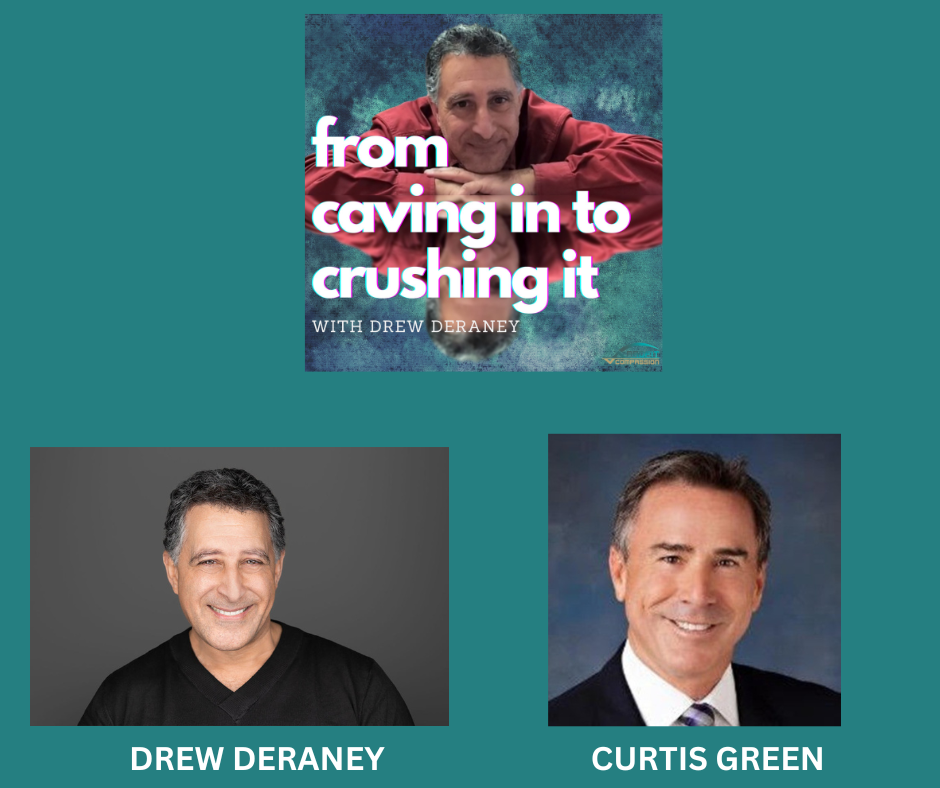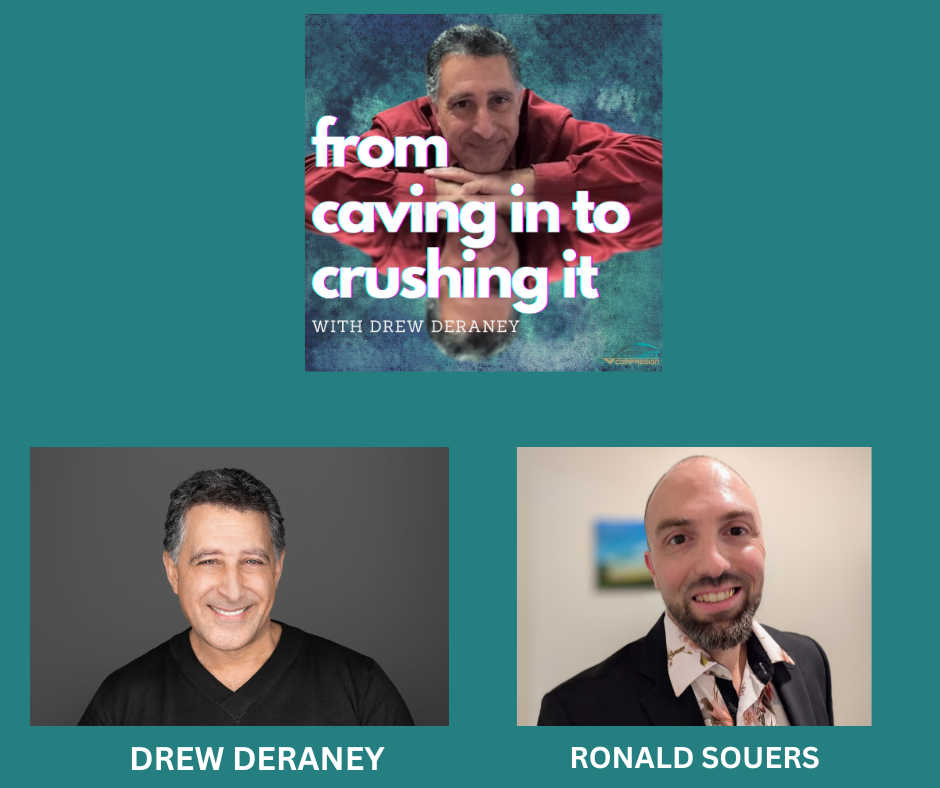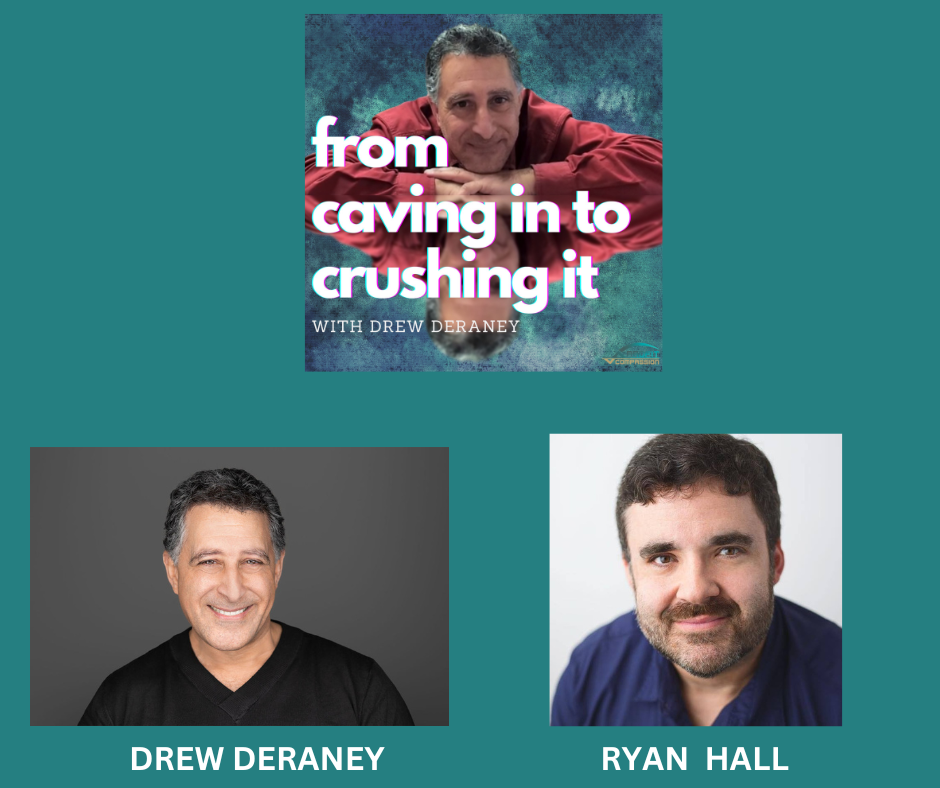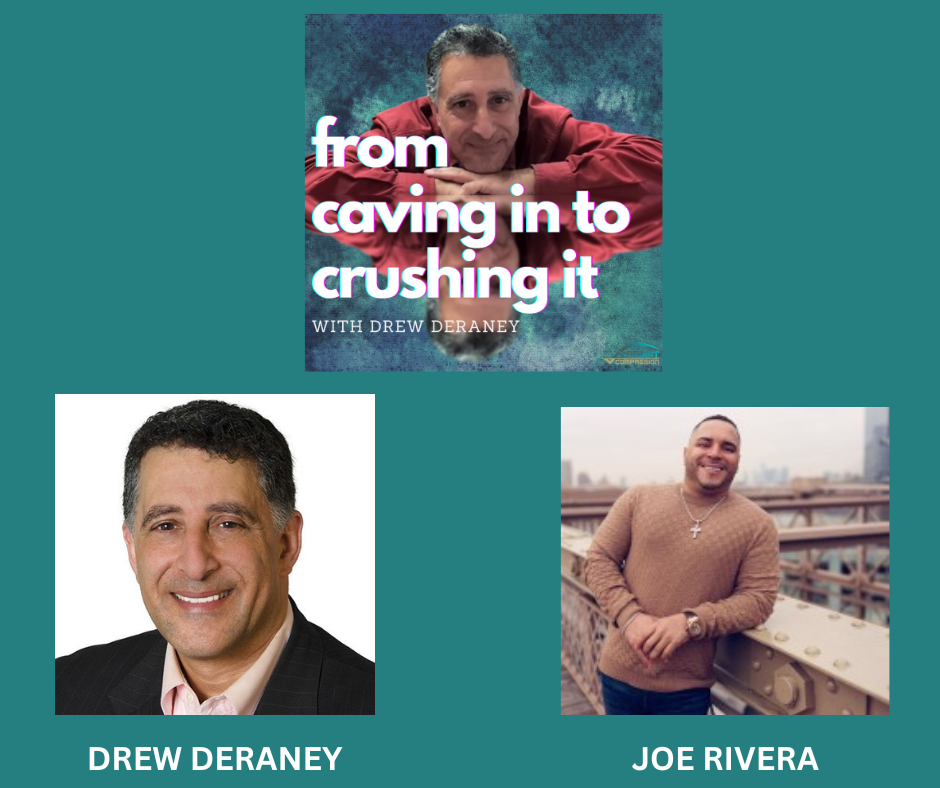[00:00:06] Speaker A: Welcome to from caving in to crushing it, the podcast for those who find themselves immersed in adversity and choose to write their story instead of having others write it for them. I'm Drew Deraney. And I'm your host, Curtis. Curtis, it's great to see you. Welcome, my friend.
[00:00:25] Speaker B: Thanks, Drew. Great to see you again. Happy Wednesday.
[00:00:28] Speaker A: Oh, happy Wednesday. Happy Wednesday. So, you know, Curtis, when we talked, a somebody said, I have to talk to Curtis. And I always like to give credit to people who introduced me to wonderful human beings. And you certainly meet the category of a wonderful human being. And I am scrolling on my spreadsheet here to find out how we met. And I have to thank Mitch Patridge for the introduction. So thank you, Mitch. So, Curtis, it's great to have you here. And I bring people on who have gone through challenges in life that bring us to the point where we have a choice. We have a choice to retreat and give up, or we have a decision to move forward and do something with that challenge. And you certainly meet the criteria of somebody who did not retreat. And when you hit your defining moment, you noticed what it was and you did something about it. So if you could, for the audience, reach back as far as you need to reach back, find that defining moment, and bring us through your journey, because we know it was not a linear journey. Life's not a straight line. What brought you to who Curtis Green is now?
[00:01:47] Speaker B: Well, thinking through that, it's about in my mid thirty? S, and everything was about hustle, hustle, hustle. Get ahead, get ahead, get ahead. What are your friends doing? How much money are you making? Charging, charging, charging. And one of my good friends from college, his youngest daughter was one and a half, and she was diagnosed with a brain tumor.
It kind of hit all of know, like, wow, this hasn't hit home to us at this point yet, our group of friends.
So we all gathered at Chalk Hospital in Orange County, California. And when I walked in there and saw the pain on these families faces, what they were going through, the unknown that seemed to be ahead of them, it really struck me and hit me. See that tension in a father's eyes and it stayed with me.
It's like everything slowed down for a while as I tried to soak all of this in.
And that moment kind of changed me and made me think about things. And it took a couple of years.
A couple of years later, my friend called me, whose daughter, she survived, but back then, they just did too much radiation. So she's still alive today, but doesn't live a real full life.
[00:03:11] Speaker A: Wow.
[00:03:12] Speaker B: They make the most of it. But back then, he had joined another nonprofit, pediatric cancer research, PCRF. And he invited me to one of their fundraisers, a black tie fundraiser. So I rented my tux because I didn't have one, and went there. And I was pretty amazed about how nice it was to be in a room of that size of 300, 400 people all there for the same reason.
And it really felt good to me to be a part of that and made me want to contribute and start saying, you know what? Stop thinking about me. Me.
What else is out there?
So that's what I did. I went back home, and that night I was laying in bed trying to figure out what I could do.
I had a mortgage company at the time, a small one, with about twelve employees. My partner and I. And I came in and I said, I'd like to form our own fund, and we'll gather monies together, or donations, and we'll give them to pediatric cancer research.
[00:04:14] Speaker A: Okay.
[00:04:16] Speaker B: And I told our employees about it, and they all wanted to jump in as well. So we created an auto deduct on their paychecks, pretax. We take it automatically as $5, $10 a paycheck, whatever it was, right? And that's how it all started. And we created this little fund, and we would donate the monies once a month, take the monies out of our account, shared account. And that's how we started working with pediatric cancer research.
And then my birthday party came up. I decided to turn that into a fundraiser. And so I got some live auction items at the last minute and told one of my friends he's going to be the auctioneer that night.
And we raised $25,000.
[00:04:58] Speaker A: Oh, my.
[00:04:59] Speaker B: And so it was like, wow. Okay. So we started doing that every year on my birthday.
Well, as things started evolving, and this is, I think, the energy that comes about from doing something like this, how energy like that can create something back in.
[00:05:17] Speaker A: Absolutely.
[00:05:18] Speaker B: And we were probably raising about the company had grown quite a bit to a couple of hundred employees. We were raising about $100,000 a year.
And I wove it inside the fabric of our company. So when you walked into our lobby, you saw everything about our nonprofit. You didn't see anything about our company.
[00:05:38] Speaker A: Okay.
[00:05:39] Speaker B: And most 80% of our employees were all involved. I never told them they needed to, but they just wanted to be sure.
So about that time, I got a phone call from a young gal who used to babysit my nephews. My sister was a 37 year, school teacher. And they would go on vacations. They always come to wherever Uncle Bud was living.
And I got to know her very well, and she had grown up, gone to NYU and.
[00:06:07] Speaker A: Are you Uncle Bud?
[00:06:09] Speaker B: I'm Uncle Bud.
[00:06:10] Speaker A: And when's your birthday? So people know when you do the fundraising?
[00:06:15] Speaker B: It's September 20 eigth.
[00:06:16] Speaker A: It's coming up, too. All right.
[00:06:18] Speaker B: Yeah, it's actually this year. It's always in October. Now it's October 14 is when we have our event.
[00:06:23] Speaker A: Okay.
[00:06:25] Speaker B: Yeah. So she said, you need any help with that little nonprofit of yours? And I said, well, why don't you come on in? The next day, I ran into my business partner. I said, we finally have someone that can run this. She doesn't know it yet, but she's going to run this thing.
[00:06:41] Speaker A: I love it.
[00:06:42] Speaker B: And that's what she came in, and she says, wow, okay, you really want me to do this? Well, what's the compensation like? And my partner and I looked at each other, well, there is no compensation.
You just get us.
So she took the job.
[00:06:58] Speaker A: Oh, wow.
[00:06:59] Speaker B: And the two of us went out and started forming a board together. And the bottom line is leadership with my relationships. We created a board of people that were entrepreneurial, that wanted to give back, and that wanted to be a part of something fun, because I always tried to make it fun for everybody. If you're going to be on a board, you want to be with people that are like you. And if we're going to have meetings and get togethers, you want to have fun doing it. And so, flash forward now another 16 years.
We've got a board of 20 on the board.
We broke off from PCRF because research is incredibly valuable, but we wanted to touch and feel the families, of course, the kids. We wanted more involvement. So we went to chalk hospital and asked them, what do they need? They came back to us and said, we have all these families that are living. We determine this at or below the poverty level, and they can't get help.
If they have cancer, they have some luck. If they have any other type of illness, there's nowhere to go.
So we created a monthly stipend that they would get that would go for rent or for goods. It wouldn't just go straight to them.
And then we embarked on a basket delivery program that we would deliver food and necessities on Christmas toys, and we included the entire family. We always include siblings, everyone.
So we deliver on Thanksgiving, we deliver on Christmas, the holidays, Easter. Okay. And we just did a big back to school we delivered 850 backpacks.
[00:08:46] Speaker A: Oh, my gosh.
[00:08:46] Speaker B: Full of supplies. Wow. Yeah. So we really try to embrace the entire family. We have full time therapists that work with the families, help them go through all this. We partnered with other nonprofits that help them find employment.
We bought a twelve unit apartment building near Chalk hospital.
I got one of the banks that needed CRA credits because they have to do a certain amount of lending with nonprofits.
[00:09:13] Speaker A: Okay.
[00:09:14] Speaker B: They did a two and a half million dollar loan for us for $50,000 down.
[00:09:18] Speaker A: That's good to know. I don't know if people know banks need to give the money to nonprofits, so that's good to know.
[00:09:24] Speaker B: They have to. Yeah. We caught them on December where it was the end of the year, so they had to pull the trigger.
[00:09:30] Speaker A: Go in December. I love it.
[00:09:32] Speaker B: So, yeah, we bought this twelve unit apartment building half a mile from Chalk hospital and we completely refurbished it, took it down to the studs, got Ikea involved with all the furniture. Vizio did all the tvs. We have all the apartments we'd have themed to the families coming in. What do the kids like? Are they Dodgers fans or Angels fans? We'd have that done and we created a community for them.
[00:09:57] Speaker A: Wow.
[00:09:58] Speaker B: We have movie nights there. It's like an oasis.
So it's two year contracts that we do with them and they can stay if their child is still suffering and not in remission yet.
But that has worked out really well for us.
We have another one, hopefully under contract, not too far away, near Disneyland right now.
[00:10:20] Speaker A: Another building, another apartment building.
[00:10:22] Speaker B: Their apartment building.
[00:10:23] Speaker A: Okay.
[00:10:23] Speaker B: Yeah.
[00:10:23] Speaker A: Good.
[00:10:28] Speaker B: Our gala. Now it's called a gala instead of my birthday, thank God, Uncle Bud's gala.
And last year, instead of 25,000, we raised 3.8 million.
[00:10:39] Speaker A: Congratulations. That's beautiful.
[00:10:41] Speaker B: That's fun. That really helps us do more. We've now embraced five different children's hospitals from San Diego up to Los Angeles.
[00:10:49] Speaker A: Great.
[00:10:51] Speaker B: And when we set up these relationships, mind you, first the hospitals want the funds to come to them.
[00:10:58] Speaker A: Okay.
[00:10:58] Speaker B: And I said, we can't because these are monies we're raising from people we know. I have to account for every dollar.
[00:11:07] Speaker A: Yes.
[00:11:08] Speaker B: Period. We have to. So they finally gave in in the beginning, and now that's just the course of business, that we control the funds, we give the funds to the families. And even though as involved we are, we have a staff of 20 now that we're still. Eighty cents of every dollar raised goes to the families, which is really hard to do when you're that involved and that employee takes that many people village to really do what we do, right.
So, yeah, things are great. We want to continue to do more. We raised a total of $7 million almost last year.
And it's just grassroots. We really don't do any big publicity items or anything like that.
But we're just trying to continue to grow to get the right people, the right corporations involved with us so we can do more. I mean, that's our whole intent is to just continue to do more and help more people.
[00:12:03] Speaker A: Wow. That's unbelievable. Now, when this happened with your friend's daughter, how old were you at that time?
[00:12:11] Speaker B: I was thinking about it. I believe I was around 35.
[00:12:15] Speaker A: 35.
[00:12:15] Speaker B: Right around there.
[00:12:17] Speaker A: That's about the age when men are really seeking to do more in the world because we're wondering where our place is, what our purpose is. And for that to happen during that time, for you and for you to recognize it is big because you could have as good a person as you are not acted on it.
The two years it took is just two years. And the fact that you felt what you felt when you were in the audience of 304 hundred for something like that and to take that next step and bring it into your own company is a testament to you. And we need more people like that. Curtis, so thank you for doing what you did at the age 36 years old.
[00:13:05] Speaker B: Well, thank you. I've reaped so many rewards because like I said earlier, the energy that comes out, the type of people you end up attracting and surrounding yourself are so like minded that it helps in business. It really does. I mean, I have so many contacts now because of it. And it just will stay with me for the rest of my life.
[00:13:27] Speaker A: Right? Absolutely.
When the children are in remission and then they leave the apartment, do you have a mechanism to keep in touch, see how they do get feedback and do they pay it forward and let other people know that you exist?
[00:13:48] Speaker B: Oh, sure, yeah.
We stay in constant contact.
Just because they're in remission doesn't mean that we still can't help them.
It's amazing because they need to be near the hospital when things are desperate.
[00:14:09] Speaker A: Sure.
[00:14:10] Speaker B: And when we were doing our deliveries on Christmas or whatever holiday, we'd find people living in somebody's garage.
[00:14:17] Speaker A: Oh, my goodness.
[00:14:19] Speaker B: With a hot plate. That's all they're using. I found a mother and a daughter and that's all they had.
[00:14:24] Speaker A: Oh, my gosh.
[00:14:26] Speaker B: So it just really breaks your heart because it's a double whammy.
[00:14:30] Speaker A: Absolutely.
[00:14:31] Speaker B: Because even if it's single parents. She can't work? No, she has to be at the hospital all the time.
So, yeah, we stay in constant contact.
Lots of times they fall out of remission and they come back.
We've had kids graduate from college and work for us.
[00:14:48] Speaker A: That's beautiful.
[00:14:49] Speaker B: So, yeah, it's definitely rewarding to keep contact.
[00:14:54] Speaker A: Curtis, man, I got goosebumps. That's absolutely just. It's a shame so many kids have to go through the whole cancer thing.
When things like that do happen, it's just to have a light like you and your organization be shining for them is wonderful to hear.
Is there anything else you'd like to let the audience know? Before I get to my two questions, I want to ask you.
[00:15:25] Speaker B: Fire away.
[00:15:26] Speaker A: All right. So you have the opportunity of sitting down with seven to ten year old Curtis, and you want to give him advice on life. What are you going to give him?
[00:15:41] Speaker B: So when I was a kid, I got caught for throwing rocks at a building.
And my dad did two things.
He sat me down and he grabbed a big rock and he put it in my hand, said, that will not leave your hand. When you come home from school, you're going to hold that rock. You're going to take a shower with it. You're going to have it with you the whole time. My dad was from Oklahoma.
And then the other thing he said, and he know your mom volunteers as a pink lady at the hospital. You're going to go spend some time with her. Doing that.
You're going to learn what it's like. You're going to help people instead of trying to destroy someone's building.
[00:16:24] Speaker A: Oh, my goodness.
[00:16:24] Speaker B: Properly.
So that's where that started. I think back all the way back then that I'd go hang out with my mom in her little pink lady outfit and help her.
My dad had built her this little room where she could do these little trinkets and make them, and then she'd go sell them at the hospital. So I have to go in there and help her do all these trinkets. And my buddies are playing outside and I'm in there doing these little trinket things at ten years old. Yeah. So that was number one there.
[00:16:54] Speaker A: So the advice you'd give him would be to.
[00:16:57] Speaker B: Same advice dad did, help other people.
[00:17:01] Speaker A: There we go.
[00:17:02] Speaker B: Not just yourself.
[00:17:03] Speaker A: Beautiful. All right, so put on a different hat. And now you're sitting down with Curtis, the young entrepreneur, young businessman, and you want to give him advice about business. What are you going to tell him?
[00:17:15] Speaker B: Give back.
Don't just worry about yourself. Give back and you'll get it back in space.
Help other people.
[00:17:24] Speaker A: I love that. Well, Curtis, I could talk to you forever, my friend. Well, the audience certainly has grasped the essence of Curtis Green and they're going to want to get in touch with you. And our goal here is to make it easy for them to do.
I would, I would say if you do reside in Southern California and you personally would like to get involved with miracles for kids, please reach out to Curtis to do that. Miraclesforkids.org is the website and I'll have Curtis's email address in the show notes. So if you live in Southern California or close to that area, please get involved personally. If you do live elsewhere, donations, please consider donating to this worthy, worthy cause, miracles for kids. God knows they need your help. It's a wonderful service that they provide. And Curtis, you know, I just want to thank you for coming on and being part of my life. And I thank Mitch for introducing us because I think my biggest win is when somebody introduces me to a good human being and we can connect on a bigger, higher level and do good for others. So I thank you again, Curtis, for coming on and coming into my life, my friend.
[00:18:43] Speaker B: Thanks, Drew. I feel the same. I appreciate you having me on. And our website is miraclesforkids.org, everybody.
[00:18:48] Speaker A: Miraclesforkids.org.
[00:18:50] Speaker B: Yeah, check it out. It's a fun website.
[00:18:52] Speaker A: Absolutely.
[00:18:53] Speaker B: Thanks, Drew.
[00:18:54] Speaker A: You're very welcome, Curtis. All right, everybody, take care of yourself and be well.
Thanks so much for listening. If you enjoyed the episode, please subscribe and give us a review to help others find it. If you find yourself immersed in adverse and would like to find support from other men in times of struggle, please become a member of my men's supporting men collaboration tribe by emailing me at
[email protected] expressing your interest and I'll get in touch with you, speak to you soon.




